 |
 |
 |
 |
 |
 |
 |
 |
 |
 |
 |
| Deep-sea fisheries |
| Genetic modification |
| Global warming |
| Miscellaneous topics |
| Native species control |
| Seabird protection |
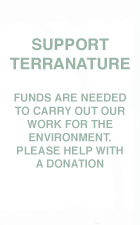 |

|
|
|
The comments presented are from interested people wishing to express their views, pass on information, and participate in discussion on various environmental issues. Their comments are not necessarily the opinion of TerraNature, and may not represent a position TerraNature takes. |
|
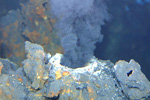 |
Deep-sea conservation Related TerraNature Article: |
|
The mere thought of dredging for minerals on ocean seafloor is preposterous. It will be just as damaging as bottom trawling. The seamounts have become real targets for destructive exploitation - first bottom trawling and now mining. Mining before science has the chance to discover the unique ecosystems of seamounts is as barbaric as cutting and burning the kauri forests by our ancestors in the 19th century and before. Georgina Wilson, Auckland 30 May 2005 The article revealing Neptune Resources prospecting on the Kermadec Ridge is a real
shock. It looks like the government has got itself into another difficult situation where
it will be obliged to issue a mining licence, when nobody seems to know how to get the
minerals to the surface. Where has the information on mineral prospecting on the Kermadec Ridge been hidden
for so long. The Ministry of Economic Development has obviously not been interested
in publicising it. I wonder why. We need to watch closely to keep a check on
the next move by the Ministry and Neptune Resources. What an unbelieveable thing - to give one company such broad rights to prospect for
minerals over such a large area of ocean. It seems the Minister of Energy has given
away the farm. I would like to know what recourse there is to force a public
environmental review process, should Neptune Resources proceed to obtain a mining licence. |
|
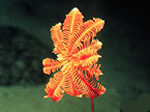 |
Deep-sea fisheries Related TerraNature Article: |
|
Why is it that the Department of Conservation has been conspicuously absent from any
research within the NZ Exclusive Economic Zone. DOC has been involved with research
expeditions in the Ross Sea in the Antarctic, and on the Lord Howe Ridge with the
Australian government, but nothing within New Zealand ocean territory. Of course
there has been no conservation action in the EEZ either. While DOC does nothing,
IGNS (Institute for Geological and Nuclear Sciences) is going to the Kermadec Ridge on
a regular basis to find the potential for the mining industry. Is a video absolutely necessary? I know it would have a vivid impact on people,
but for me it is pretty easy to imagine the nets full of fish, the cables and the trawl
gear dragging across the bottom of the ocean crashing everything growing above the
seafloor and churning up everything below it. It would be great to show live bottom trawling action with video, not only to the
New Zealand public but the whole world. It would not be that difficult to do.
The tricky part is getting someone to do it. Ted Armstrong is quite right, but the fishers will never show anyone what bottom trawling looks like. It could be shown by the Ministry of Fisheries with one of the NIWA research vessels, but there again they may not want to show how damaging it looks either. There would be such strong public opposition once people see how destructive it is, it would kill the fishing industry. Arty David, San Francisco 14 January 2005 The fishing industry claims that new bottom trawling gear causes less
damage on the seafloor. This is hard to believe. The industry needs
to be held accountable by showing the impact of trawl gear. It could
be easily done with video. Other industries on land have to show the
environmental impact they cause, even on their privately owned property.
Why should fishers not have to, for seafloor they do not own. It would be great if the government disclosed the extent of bottom
trawling. The problem would be quickly solved because there would be such
strong public objection. But the Minister of Fisheries will never do
this because he will not take action that would kill a major New Zealand
export industry. Thanks for highlighting the issue of bottom trawling. As an
"out-of-sight, out-of-mind" problem, we need to make both the industry
and the government aware that current practice is not acceptable. It is shocking to me that environmental destruction of the magnitude
of bottom trawling can happen in the 21st century. The New Zealand
settlers of the 19th century were ignorant of the need and benefit of
conservation. We are not. We know what a great loss rampant
cutting and burning of the kauri forests was. The same disregard
for 2000 year-old kauri, now for coral species that are hundreds
of years old that we have not even seen, is the greatest environmental sin. While the government pisses around discussing policies and negotiating
agreements, the coral keeps on getting flattened. A moratorium is
absolutely essential. The announcement by the three Cabinet Ministers on September 24 is another display of the relationship between the Ministry of Fisheries and the fishing industry. The planned actions by the government do not appear to be genuine. What they propose will take the usual eternity, and meanwhile the fishers will continue to destroy irreplaceable deepsea habitat. The suggestion of "volunteer" actions by the fishing industry, which was the approach with seabird killing, is once again inappropriate, and another sign of whitewashing the problem to let the industry off the hook. Graeme Roberts, Auckland 21 October 2004 |
|
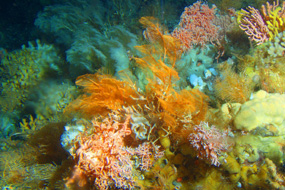 |
Deep-sea fisheries Related TerraNature Article: |
|
It is about time for the Minister of Fisheries to tell the truth to the New Zealand
public about the extent of deepsea bottom trawling. The secrecy that is protecting
the fishing industry from a public outcry must end. When Greens Party Leader Jeanette Fitzsimmons sought support in Parliament for a
United Nation's moratorium on bottom trawling, she held up a 5 foot tall piece of cold
water coral, and asked Fisheries Minister David Benson-Pope "Is he concerned that New
Zealand is one of 11 nations still bottom-trawling and that this has obliterated forever
this 1,000 year old gorgonian octo-coral". "Everything in the path of these weighted
nets is obliterated" she said. In his reply Mr Benson-Pope said there was no doubt
bottom trawling could be destructive "but the extent of that is the subject of
substantial debate". The total extent may be debatable but there is no argument
against the fact that bottom trawling has covered a very large area. While not all
damage is recorded, reported trawls show a massive area that has been trawled. New
Zealand must stop bottom trawling, and must call on the United Nations for a
moratorium. I am ashamed of the New Zealand government with its two-faced approach to ocean conservation. How can government go after foreign fishers when it lets the New Zealand fishing industry get away with murder. Protectionism has become very apparent. It is about time something is done about deep-sea coral destruction and depletion of fish populations. Carly Simmons, Wellington 26 July 2004 In June, the Minister of Fisheries, David Benson-Pope, approved a plan that will combat
illegal domestic and high seas fishing. This is fine - to control foreign fishing boats
and allow effective management of fisheries. But what about control of New Zealand
fishing boats. The Minister says "The sustainability of global fisheries resources
is one of the key environmental challenges that face the international community in the
next decade". This statement is contradicted by the Ministry of Fisheries' refusal
to stop bottom trawling by the New Zealand fishing industry - the most destructive fishing
practice that is in no way sustainable because it destroys the habitat fish need to
regenerate. Good on the Ministry for taking on foreign fishing, but could this be
protection for New Zealand fishing companies. Even so, the MOF should be paying more
attention to banning destructive fishing by New Zealand companies. It is shocking to find that so much destruction of deepsea coral is going on without
the Ministry of Fisheries or the Department of Conservation saying very much about it.
The Ministry's action to close fishing on 19 isolated, independent seamounts is rather
pathetic. I have not seen any evidence that this is being enforced. They will
not put observers on board fishing vessels, so it seems impractical and ineffective
otherwise. The deepsea corals are out-of-this-world stunningly beautiful. It is such a pity
we cannot see them live. But the pictures speak a thousand words, and are the next
best thing to make us aware of the need to protect coral. Seeing these images opens
the intrigue for all sorts of different creatures that we could never imagine, that must
be down there. I will do whatever I can to support the protection of these incredible
environments. I have just one thing to say to the Ministry of Fisheries on the subject of sustaining
deepsea benthic habitat - DO SOMETHING! Once again, I am amazed and flabbergasted at what I am learning about the deep-sea. Where has all this information been hidden? Thank you TerraNature for making us aware. The deep-sea corals are magnificent and must absolutely be protected within marine reserves of a meaningful size. Georgina Wilson, Auckland 6 March 2004 The governments attending the Convention on Biological Diversity have to pass a resolution to get the General Assembly of the United Nations to adopt a moratorium on deep-sea bottom trawling. This is the best hope to stop the destruction of cold water coral, as is seems governments are not going to do it on their own as long as they are supporting their fishing industries. Peter Callum, Wellington 17 February 2004 |
|
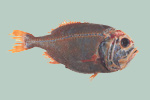 |
Deep-sea fisheries Related TerraNature Article: |
|
The truth about the quota system is now being exposed - when the hoki fishing
companies stop fishing voluntarily it is obvious the fishery has been overfished.
The New Zealand quota does not seem to have been very effective in stopping decline,
and doesn't seem to mean very much. It is a lot of work keeping up with the actions of the Ministry of Fisheries and the
fishing industry. The first quota decision of new Minister David Benson-Pope is
particularly disturbing. He has kept the southern blue whiting quota in the
Southern Ocean the same at 25,000 tonnes after the Ministry first advised a reducton
to 15-20,000 tonnes, but then changed this advice. According to the Minister,
new stock assessments followed the advice. He said the science was "challenged by the
fishery (industry)". The Minister is giving the industry a handout in the face of
looming hoki reductions, with an increase in the squid quota from 44,000 to 57,000
tonnes. The Minister has justified his decisions by "trying to strike a balance
between good development of the resource and employment and economic issues". The
Minister's first responsibility is the protection of fishery resources, not keeping the
fishing industry happy. History shows continued declines, so if a decision has to
be made based on questionable data, the conclusion should favour sustainability of the
resource. If that decision turns out to be wrong it is easier to raise the quota
later, rather than suffer further damage to the resource that could be irreparable.
Strangely, Mr Benson-Pope agrees with this, and contradicts his quota decision, saying
that if scientific assessments of stocks were in doubt, decisions would be
"conservative". He stated "I will come down on the side of protecting the
resource rather than allowing fishing levels that may be risky." It is no surprise that the Herald reports on the severe decline in hoki and snapper,
and likely reduction in fishing quotas. It is obvious that for a long time the Ministry
of Fisheries has been lowering the quota as catches decline, instead of setting quotas
based on surveys, and take levels needed to achieve sustainability. Maybe the new
Minister of Fisheries will realise that there will be no $1.2 billion fishing
industry if current declines continue, and that the quota management system is not
working. But watch the phone lines to the Ministry light up as the fishing industry
tries to hold on to quotas - fish or no fish. It is interesting to see that Nelson fishing boats have been tied up in port, due to
hoki fisherman being unable to meet quotas, and the high value of the NZ dollar affecting
exports, according to the fishing companies. It will be more interesting to see
if this down cycle continues, which, if it does, will be a pretty good indication of
overfishing. It will then be even more interesting to see if the Ministry of
Fisheries lowers the hoki quota later this year. It seems the quota is reduced
when there are smaller catches, instead of the quota causing smaller catches. At the Deep-Sea 2003 conference, Ministry of Fisheries Chief Scientist, Dr John
Annala, fended off "scare tactics by Australian environmentalists" by claiming that
"New Zealand is one of the few countries in the world that continues to harvest
orange roughy sustainably" and that "orange roughy is one of the true success
stories of the quota management system". This promotion in the interest
of the fishing industry has of course been extended by the New Zealand Seafood
Industry Council (November 28 2003 press release). What the Ministry and
Council do not mention, is the destruction of cold water coral by bottom trawling,
which is the principal method of catching orange roughy. Bottom trawling nets
have smashed and raked up thousands of tons of coral, including coral trees that
were 5 metres tall and thousands of years old. As trawling over the same area
has continued, the quantities of coral in nets has reduced, indicating there is
not much left on the seabed. As the Ministry of Fisheries and the fishing
industry defend the virtues of sustainable deep-sea fishing, they ignore, or
fail to mention the fact that the habitat of the fish that are allegedly making
a comeback, is being destroyed. The destruction of deep-sea biodiversity
by overexploitation from fishing is comparable to the destruction of the kauri
forests on land more than a century ago. The kauri loggers at least had the
excuse of not knowing about the long term impact of the loss of biodiversity, whereas
the fishers of today do not. The government is aware of coral
destruction from NIWA surveys, but have only acted to close 19 seamounts to fishing
and not all of these have been damaged or are being fished. What is inexcusable
is the lack information that is made available to the public, so the deep-sea remains
out of sight and out of mind to most, while fishing companies quietly carry on
with their destruction. As coastal fisheries the world over have been overfished,
and the industry has moved into the deep ocean, it seems New Zealand is no different
in making sure the fishing industry and the benefit of fishing to the national
economy are protected. The collaboration of the Ministry of Fisheries and the Department of Conservation with the fishing industry through the Southern Seabird Solutions Trust is a conflict of interest, as the Ministry currently investigates the alleged misreporting of fish catch from five fishing companies. The SSS Trust was formed to promote voluntary mitigation measures by longline fishers to prevent seabird bycatch. The Trust conflicts with the government's ability to enforce fishing laws and regulations. This method of working with industry is no different than forming a trust that has the defendant and the prosecutor in a criminal case as trustees. It is necessary for the Ministry of Fisheries to separate itself from all matters involving the fishing companies it is obligated to regulate. Carly Simmons, Wellington 18 February 2004 With much regret, I have taken orange roughy off the menu. It is a pity because
it is such a great tasting fish, and a great export for New Zealand. The fisheries
people need to get their fish quotas in order. It is hard to see how a fish that
lives 150 years and takes so long to reach breeding age, can be sustainable with the number
of fish being caught. The Ministry of Fisheries and the fishers have not done a
very convincing job of showing us how they have determined the current fish count. Thank you TerraNature for the report on orange roughy. These articles on environmental
issues are very informative and interesting, if not disturbing. I shamefully admit
I knew absolutely nothing about the deep ocean or seamounts. Please keep the information
flowing on this really fascinating stuff. It is what everyone needs to know.
|
|
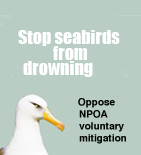 |
 |
  |

 Kermadec Ridge mineral prospecting:
Kermadec Ridge mineral prospecting: View larger image
View larger image
